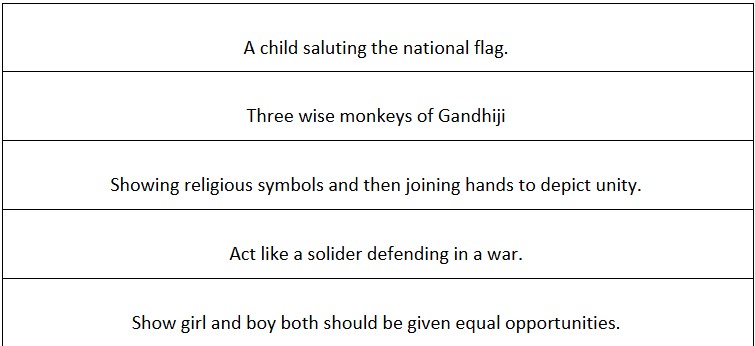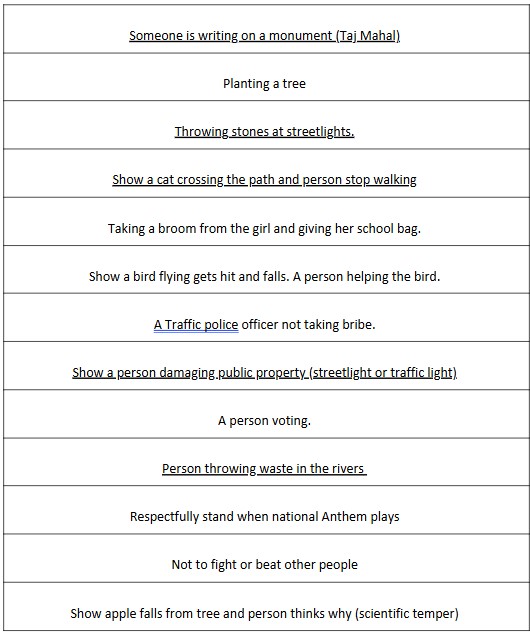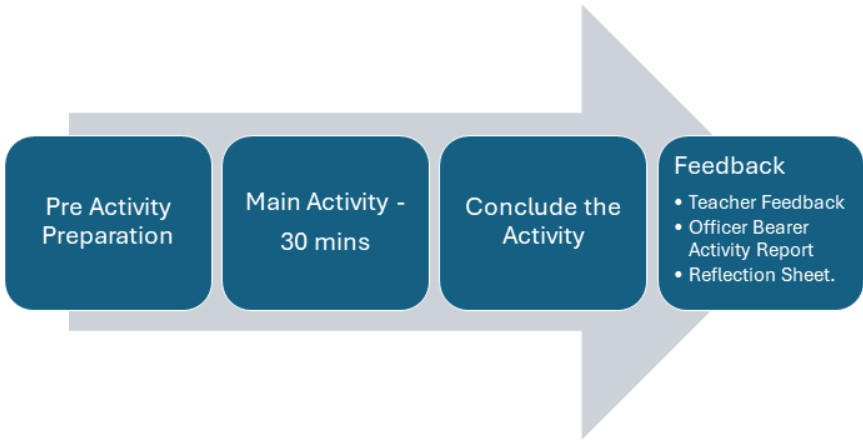September Activity – Citizen Charades
OBJECTIVES
- To comprehend about the fundamental duties of citizen of India.
- To describe the importance of the following fundamental duties.
SKILLS
Collaboration, Communication
VALUES
Civic responsibility, Respect.
MATERIAL REQUIRED
Notebooks and pens
PRE-ACTIVITY PREPARATION
- Tell the students to revise about the Fundamental Duties as per Indian Constitution. They can also refer to their textbooks for the same. Give them the task at least 2 days before the activity to prepare.
- Office Bearer will create a copy and put the Fundamental Duties given in Annexure 1 for reference.
- Office Bearer will make sure students have done this at least a day before the class by interacting with group leaders, who will make sure that their group is prepared.
- Office bearers will prepare chits to play the game.
MAIN ACTIVITY GAME
1. Divide the class into groups of 6-8 students as per the class size, or the teacher can divide them as per the class's rows.
2. Explain the rules of the game given below in detail to the students.
Rules for game
- There will be 2-3 rounds per group to guess the action. (Teacher can decide the number of rounds, minimum 2 rounds per group to be played)
- Each group will have to nominate one student to pick up a chit and act out the duty for the group. Students can call one/two students for support to enact as required from their group.
- Remaining group members will guess the action done by the nominated student.
- No hints or clues from other team members.
- Score keeper to update the score in their notes after each round.
- Each correct guess scores 5 points. Identifying if the action is a fundamental Duty of citizen earns another 5 points.
3. Play the game with students by using following steps -
A. Invite one student from one group to pick up a slip to act out the action. Chits can be created with the help of the list given in Annexure 2.
B. The student then acts the phrase they've chosen in front of their group without saying anything. The group of that student will get the chance to guess the action.Note: If the student needs help, they can invite 1 student to act with them.
C. Each team gets 1 minute to guess and enact.
D. For each correct guess, the team gets 5 points. In case the team is not able to answer in 1 minute, it will be passed on to the next team. In this case, award 5 points to guess the correct answer to team that answers.
E. Once the action is guessed, the team must tell if the guessed action is something that citizens should follow as per the fundamental duties. For correct guess the team scores another 5 points.
F. Play a dummy round with students to help understand the game.
G. The teacher will ensure that the right acting is done by students for clues for the team to guess. Note: Teacher will write all the actions on Boards & tick P if one should do it or and tick × if one should not.
H. Repeat playing the game in similar manner for remaining rounds. Ensure that repetition of representatives is avoided to make it more participatory.
I. Ask the office bearer to be scorekeeper to mark the scores of each team after every round.
Continue playing for 20 minutes or at least 2 rounds per group.
CONCLUDE THE ACTIVITY
NOTE - If time permits, teacher can give Office Bearer opportunity to do conclude this activity as mentioned below. Incase if time is short, invite the office bearer to ask the students – What did they learn from the activity?
Office Bearers will divide the class as per the rows or in four groups. Each group will get 5 mins to think/note down – why is it important to follow fundamental duties? You can also think of examples to highlight the consequences of not following fundamental duties. For example, protection of environment is our duty, if keep using and throwing plastic bags & bottles after each use, we are harming the environment. So, we should avoid opt for cloth bag & reusable bottles to protect the environment.
Invite each group one by one to present the points. Limit presentation to 2-3 mins per group.
Teacher will summarize the key learning points for the activity –
- Following fundamental duties as citizen is important for our nation’s growth.
- These 11 fundamental duties are given in our constitution, and we must follow them to maintain order and make sure that our country functions well.
- We should all know about all the fundamental duties and how we can apply them in our daily life.
- If we don’t follow duties, it can lead to disturbance in society, and delay our progress as nation.
DESH APNAYEN WALL
For this activity, the following can be updated by office bearers on the wall.
- Key learning takeaways of the activity. (encourage different students to write on notebook page their learnings)
- Clues chits used during the game.
- Actizen story/newspaper articles about people who have done outstanding work at following their fundamental duties of nation. (optional)
POINTS TO NOTE (Do’s and don’t of activity)
- Ensure that correct clues are acted by students.
- If one student is not able to act alone, you can play the game in pair format.
- Keep check of time while playing the game, it is important to summarize the learnings of the activity.
ACTIVITY PHOTOS TO BE SHARED
For activity photos to be shared to engagement officers, please share clear pictures of
- Main activity - Students playing the game (2 photos)
- Office Bearer doing concluding part (2 photos)
- Desh Apnayen Wall (2 photos)
ANNEXURE
Annexure 1 – List of Fundamental Duties
These are also available in the Grade 9 Political Science textbook.
The following are the fundamental duties of India defined in the constitution:
- To abide by the Constitution and respect its ideals and institutions, the National Flag and the National Anthem,
- To cherish and follow the noble ideals that inspired the national struggle for freedom,
- To uphold and protect the sovereignty, unity, and integrity of India,
- To defend the country and render national service when called upon to do so,
- To promote harmony and the spirit of common brotherhood amongst all the people of India transcending religious, linguistic, and regional or sectional diversities and to renounce practices derogatory to the dignity of women,
- To value and preserve the rich heritage of the country’s composite culture,
- To protect and improve the natural environment including forests, lakes, rivers and wildlife and to have compassion for living creatures,
- To develop scientific temper, humanism and the spirit of inquiry and reform,
- To safeguard public property and to abjure violence,
- To strive towards excellence in all spheres of individual and collective activity so that the nation constantly rises to higher levels of endeavor and achievement, and
- To provide opportunities for education to his child or ward between the age of six and fourteen years (added by the 86th Fundamental Amendment Act, 2002).
Reference links:
https://legislative.gov.in/document-category/preamble-to-constitution-of-india/
Annexure 2 – Clues to play the game.
Chits to play the game: Action mentioned on the chit is to be enacted without speaking.
Note: Enactment examples are only given for reference. Teachers may add examples as per the local issues examples aligned to Fundamental duties.
Underlined clues do not represent fundamental duties.








